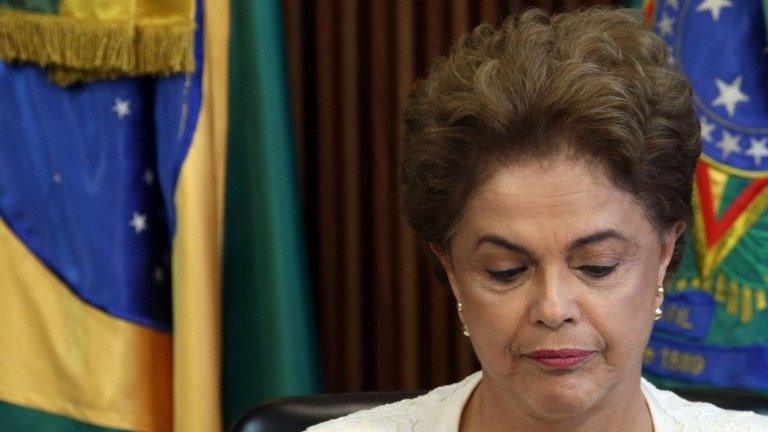Brazil Rousseff: Key party leaves president's coalition
- Published
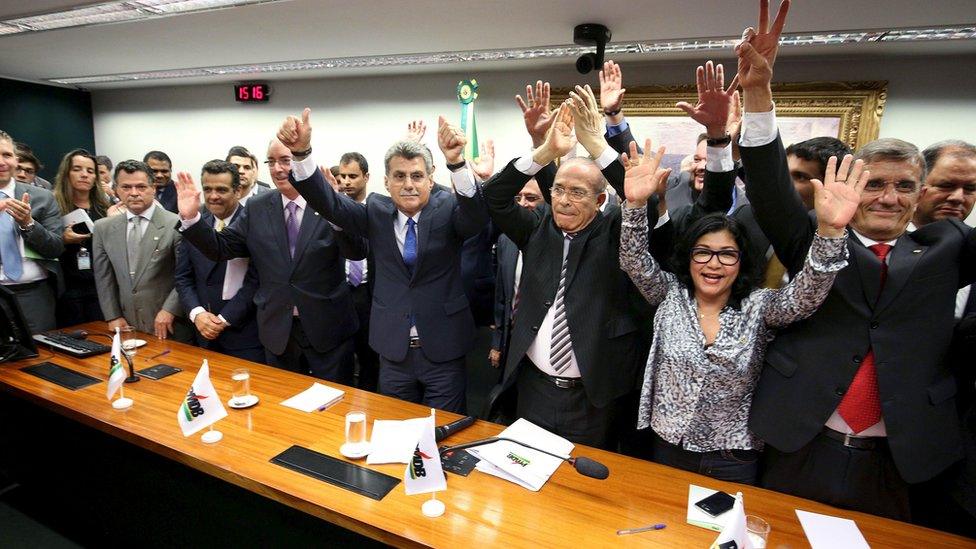
PMDB Congress members celebrated their decision to quit the coalition
The PMDB, the largest party in Brazil's ruling coalition, has voted for an "immediate exit" from President Dilma Rousseff's government.
The move could hasten impeachment proceedings against President Rousseff, correspondents say.
Opposition lawmakers want to remove Ms Rousseff over claims she manipulated accounts to hide a growing deficit.
Following Tuesday's vote, the embattled president cancelled a trip to attend a summit in Washington this week.
'Acclaim'
At its leadership meeting on Tuesday, the PMDB [Brazilian Democratic Movement Party] decided that its six remaining ministers in President Rousseff's cabinet must resign or face ethics proceedings.
Brazil tumbles like 'House of Cards'
"The decision was taken by acclaim in a historical meeting marking the withdrawal from Dilma (Rousseff's) government," Senator Romero Juca tweeted [in Portuguese], external.
The announcement came a day after tourism minister Henrique Eduardo Alves from the PMDB stood down.
The BBC's Laura Bicker in Sao Paulo says President Rousseff could now be temporarily suspended from office by Congress as early as May.
She would be replaced by Vice-President Michel Temer, leader of the PMDB, while the Senate decides if she should permanently leave her post, our correspondent adds.
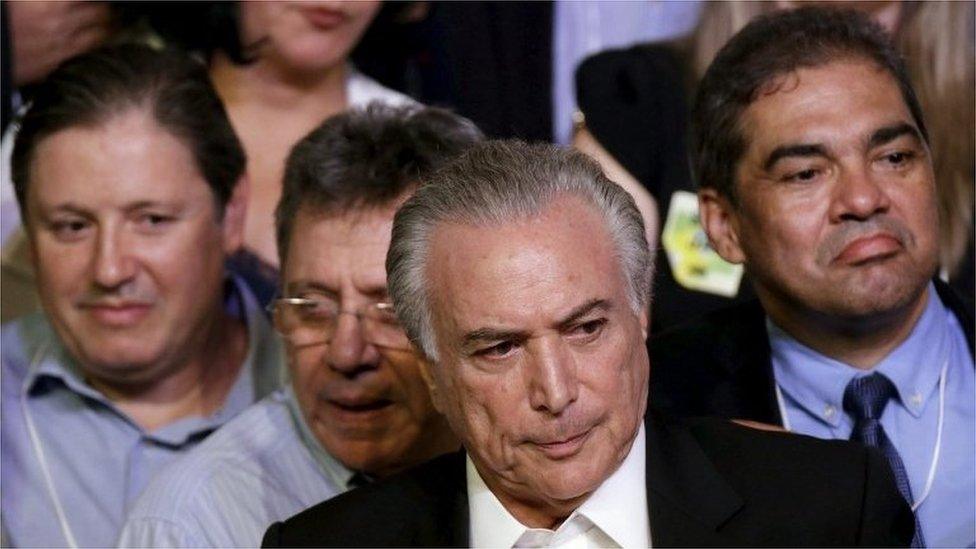
PMDB leader Michel Temer, centre, is Ms Rousseff's deputy and would become interim president should she be removed
Speaking before the vote, Osmar Terra, a lawmaker from the PMDB, said he had little doubt which way it would go.
"It will be a goodbye to the government," he said.
Analysts say a considerable number of lawmakers from the PMDB have felt uneasy about their alliance with the left-wing Workers' Party for a while.

Analysis by Daniel Gallas, BBC News, Sao Paulo
The impeachment process centres on the question of whether Dilma Rousseff used illegal accounting manoeuvres or not.
But in practical terms, MPs and senators are looking mostly on whether she has the strength and legitimacy to rule Brazil, as the country faces a severe economic crisis as well as a political one.
The PMDB was the first major coalition partner to jump ship. It is also the group that has most to gain should Ms Rousseff be impeached. Mr Temer has reportedly been talking to opposition leaders and working on forming a cabinet.
But despite her weakened stance, Ms Rousseff and her Workers' Party still have support from many in Congress and in the streets. There will be a lot to play for in the coming days.

Their unease has been compounded by calls for Ms Rousseff's impeachment and a widening corruption scandal involving senior members in the Workers' Party.
The president needs one third of the members of the lower house of Congress to vote against her impeachment for the proceedings to be shelved.
Without the PMDB, she could lose as many as 69 votes at once in the 513-member Chamber of Deputies.
Another of Ms Rousseff's coalition partners, the centre-left Social Democratic Party (PSD) said it had given its lawmakers a free vote in any possible impeachment proceedings.
Lula under pressure
On Monday, Ms Rousseff's mentor and predecessor in office, Luiz Inacio Lula da Silva, likened the moves to impeach her to a coup.
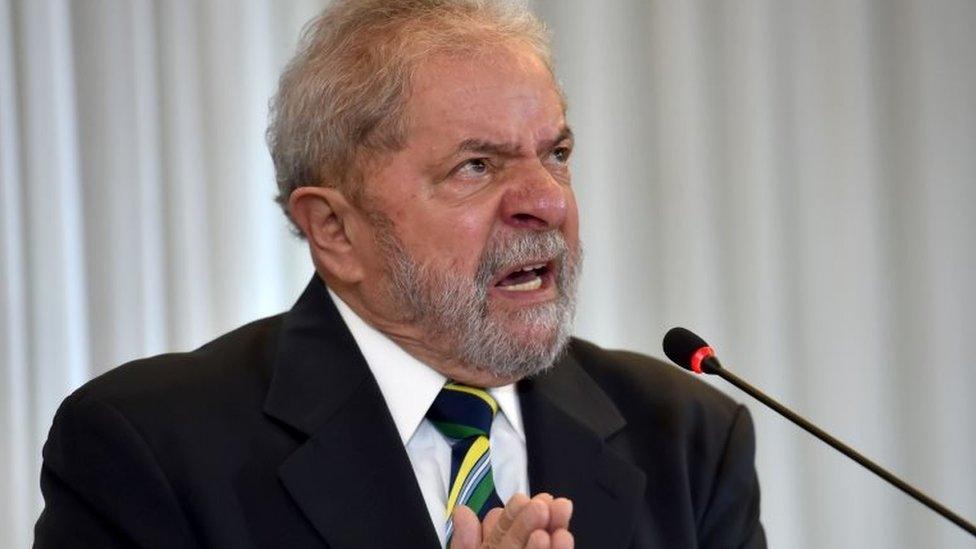
Lula says the impeachment proceedings are a coup attempt
But Lula himself is under pressure.
The Supreme Court suspended his appointment as Ms Rousseff's chief of staff earlier this month and is due to take a final decision on the matter next week.
Opponents of the government said the president had given Lula the post so he could escape investigation and possible proceedings over allegations of money laundering.
Under Brazilian law, cabinet members can only be investigated by the Supreme Court, not by lower courts.
There have been mass protests demanding the impeachment of President Rousseff in cities like Sao Paulo and Rio de Janeiro.
But there have also been rallies in support of the government by those who say the president is the victim of a campaign to drive the Workers' Party from government.
- Published29 March 2016
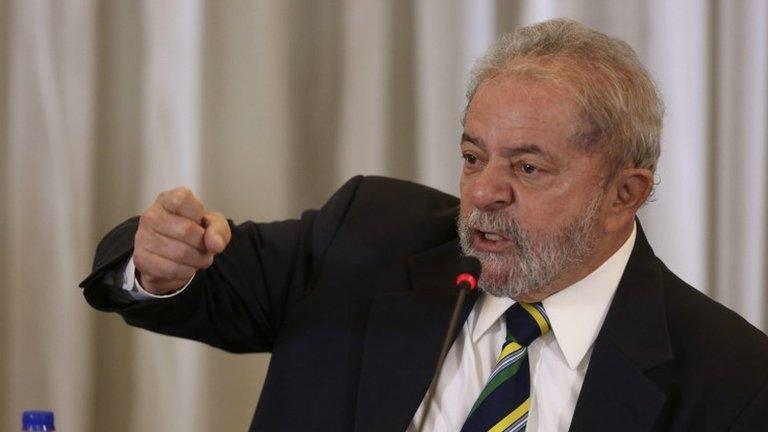
- Published8 April 2018

- Published4 March 2016
